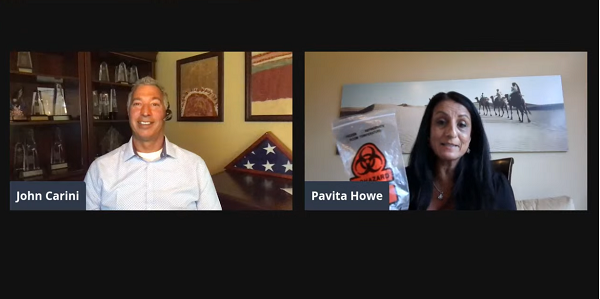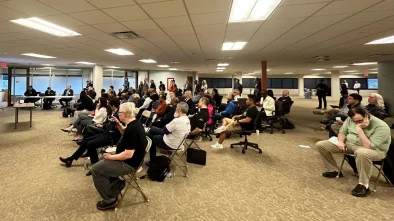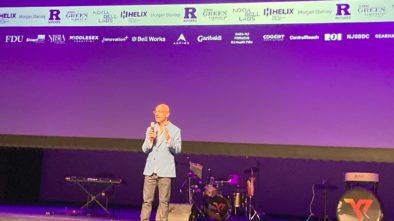Rutgers COVID-19 Innovation Takes Center Stage at Morris Tech Meetup
Pavita Howe, director of entrepreneurship partnerships at Rutgers University’s Corporate Engagement Center (CEC), had plenty of stories to tell about Rutgers COVID-19 innovations during a recent Morris Tech Meetup virtual event.
The complete video of the meeting can be found here.
The CEC is “the obvious front door for companies that want to engage with Rutgers. We help facilitate partnerships based on the interests of industry partners,” Howe told John Carini, one of the meetup’s organizers. Howe is herself a former Morris Tech Meetup organizer.
The CEC’s mandate includes things like sponsored research, access to talent, workforce development, corporate giving “and any other way that people and companies want to engage with us,” Howe said. “We also keep track of events and connections happening on campus with industry, so that we can coordinate those efforts.”
She added that her newly created role within the CEC centers around entrepreneurs, and the goal is to make the CEC “the place to go to get information about Rutgers entrepreneurial activity; to connect external partners with entrepreneurial people and programs within the university; and to also provide access to resources and make valuable connections for entrepreneurs, investors, alumni and other Rutgers supporters within that community.”
Howe works with the Rutgers Office of Research and Economic Development, the Rutgers University Foundation and university alumni. There are 500,000 living alumni, and a good number of them are entrepreneurs, she said.
In April, during the height of the pandemic in New Jersey, Rutgers became known as having the first lab the United States to receive an Emergency Use Authorization (EUA) from the Food and Drug Administration (FDA) for a COVID-19 saliva test, a real innovation, as opposed to invasive nasal swabs.
The work came out of Rutgers University Cell & DNA Repository (RUCDR), specifically, the RUCDR Infinite Biologics lab, a division that catalogs bio materials and provides bio banking services, with the mission of improving our understanding of the causes of genetic diseases and helping to develop diagnostics, treatments and cures for those diseases. A few weeks after the initial EUA, RUCDR also received an EUA to do at-home testing using the saliva method.
Bombarded by Saliva Test Inquiries
Rutgers was bombarded with inquiries about the saliva test, including the at-home version. And as the CEC frequently works with external partners, S. David Kimball, Rutgers senior vice president of research and economic development, asked the CEC “to see if we could help with handling some of these inquiries,” Howe noted. “A few of us volunteered, and I started by training with their [the lab’s] team the following week.”
Howe wound up working at the Rutgers lab that developed the COVID-19 saliva test, helping to document the procedures and create a “know-how package” that could be licensed by other labs, which would then have to get their own EUAs from the FDA. It was a heady experience, and also very fulfilling for her.
Howe explained that the saliva test is an easier and more robust collection method, as opposed to the nasal swab methods, which people find very unpleasant. And “this also doesn’t require a healthcare worker to insert a swab, so it’s less risky to the healthcare workers, and also means that they need less PPE [personal protective equipment] because they’re not using that equipment. And because the test was approved for at home testing, it’s also allowing people to take it from the convenience of their home, with the help of a telehealth provider, which is a good option for people who are sick or at risk.”
The researcher in charge of the test developed at Rutgers was Andrew Brooks, who at the time was COO and director of technology development at RUCDR Infinite Biologics.
Howe mentioned how hard everyone at the had lab worked, including Brooks. No one at the lab could work remotely. They were on the front lines of pandemic innovation, and worked exceptionally long hours, but they were dedicated to their work and to ensuring that testing would be available for those who needed it. The demand for testing was coming nonstop.
“We fielded many calls from companies, universities and other organizations wanting to set up saliva testing for their people. Dr. Brooks starts his day at 4:30 in the morning on calls, and keeps going until late at night. It’s been an unbelievable routine. And the lab team is there at all hours too. They were so helpful and responsive.”
The Spin-Out: Infinity BiologiX
In the middle of June, Rutgers announced an asset purchase agreement whereby Rutgers would receive $44 million to spin out the division as a new company. “So, the Rutgers RUCDR Infinite Biologics lab is now going to be Infinity BiologiX, a next-generation central lab that will be providing technology solutions and precision medicine,” said Howe. “The major lead investor on the deal was Viking Global Investors.” [New York].
Brooks became the chief executive and scientific officer of the new company when the deal closed this month. He retains his position as an adjunct professor of genetics at Rutgers. Other members of the Infinite BiologiX executive team include Robin Grimwood, president and COO, and Russell Hager, executive VP of strategic operations, both of whom have worked with RUCDR in previous roles.
Howe explained that the spinout will allow the lab to expand on the work being done there, and the lab itself should be able to grow, “which was not really possible in the lab’s current position within the university,” Howe noted. “But the company did commit to continuing to process COVID-19 saliva tests for the state of New Jersey, up to 30,000 tests a day and 10,000 tests a day for Rutgers. The new Infinity BiologiX will still be affiliated with Rutgers, so Rutgers can still take advantage of some of the services that they’ve used at RUCDR in the past.”
Infinity BiologiX continues to be busy, as the demand for testing hasn’t abated. The lab has worked with many organizations, including the State of New Jersey, which is using saliva testing in some of its counties, as well as its Department of Corrections and NJ TRANSIT. “They are working with Robert Wood Johnson’s healthcare system, as well as several universities to help them bring their staff and employees or students to work. We’ve had conversations with other states’ health departments, major sports organizations, and they’re actually using saliva testing for the PGA [and some of the major league baseball organizations,” she said.
[Ed update: There was news this week that Infinity BiologiX may be developing a combined flu and COVID-19 saliva test.]




